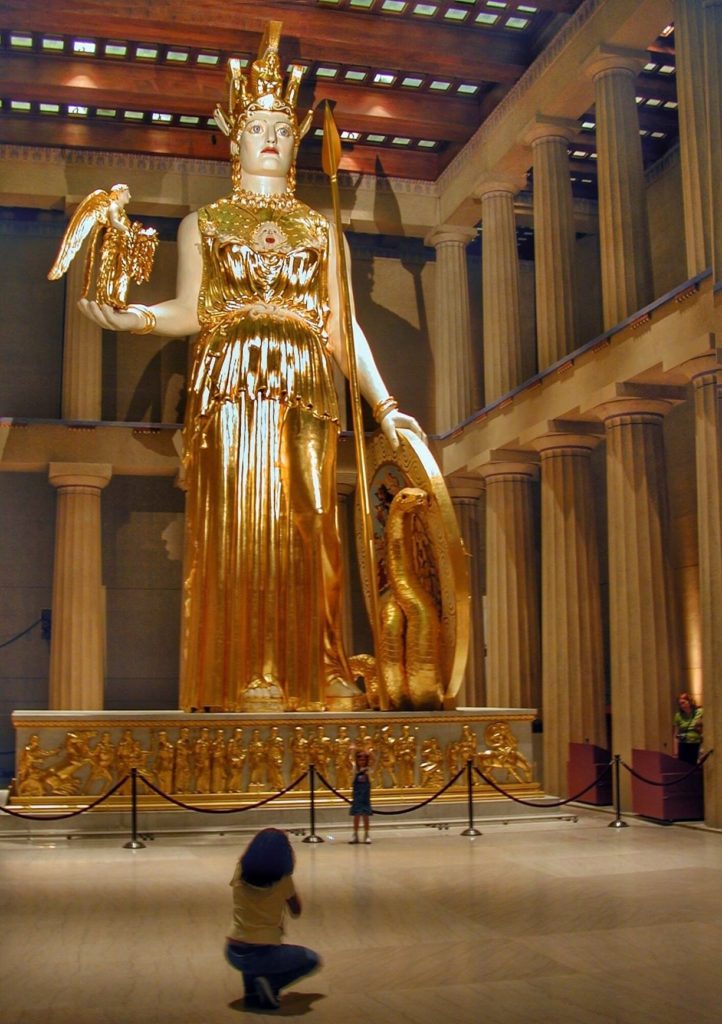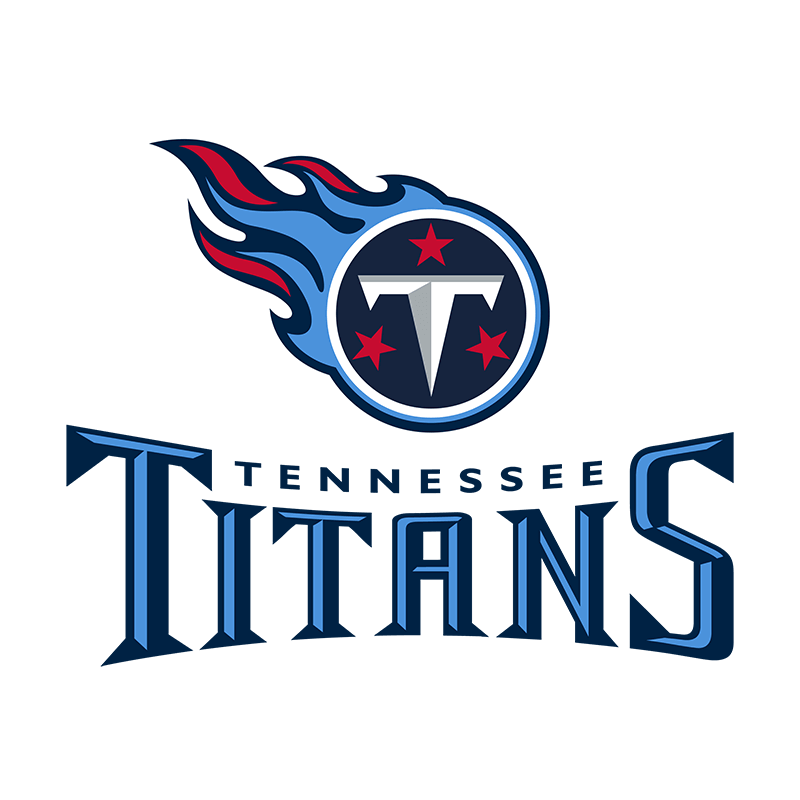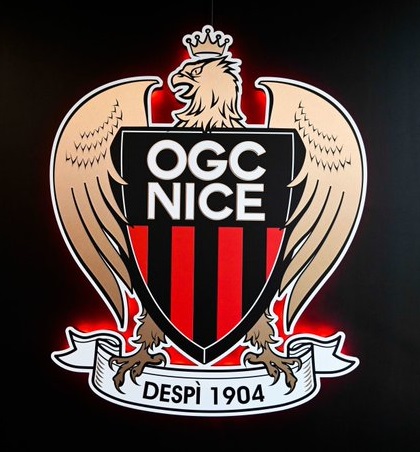Athena – Goddess of Wisdom & Civilization
Roman name : Minerva

Athena was one of the most influential and revered deities in ancient Greece. She was the patroness of the city of Athens, the goddess of wisdom, strategic war, handicraft, civilization and more, and daughter of Zeus, king of the gods.
The Birth of Athena Goddess
According to Greek mythology, Athena was born from the forehead of Zeus, without a mother. There are different versions of this story, but one of the most popular is that Zeus swallowed his first wife, Metis, who was the goddess of counsel and wisdom, while she was pregnant with Athena. Zeus did this because he feared that Metis would give birth to a son who would overthrow him, as he had done to his own father, Cronus. However, Metis was already pregnant with Athena, and she continued to grow inside Zeus’ head. Eventually, Zeus suffered from a terrible headache, and asked his son Hephaestus, the god of fire and metalworking, to split his skull open with an axe. Out sprang Athena, fully grown and armed, ready for battle.
This story symbolizes Athena’s close relationship with Zeus, and her role as his favorite child and advisor. It also shows her independence and strength, as she did not need a mother to be born. Moreover, it reflects her association with wisdom and intelligence, as she emerged from the mind of the supreme god.
Attributes
Athena was a complex and multifaceted goddess, who had many domains and symbols. She was the goddess of war, but not of the brutal and chaotic aspects of it, like her brother Ares. Rather, she was the goddess of the strategic and civilized side of war, and the virtues of justice and skill. She was also the goddess of handicrafts, especially spinning and weaving, and the patron of artisans and craftsmen. As the goddess of practical reason, she was considered the inventor of many useful arts and sciences, such as the chariot, the flute, the plow, the ship, and mathematics.
Some of her most common symbols were the owl, the olive tree, the snake, and the Gorgoneion. The owl represented her wisdom and ability to see in the dark. The olive tree represented her gift to the city of Athens, and her role as a bringer of peace and prosperity. The snake represented her connection to the earth and the ancient goddesses. The Gorgoneion was the head of the Medusa, a monstrous woman with snakes for hair, who could turn anyone who looked at her to stone. Athena wore the Gorgoneion on her shield or breastplate, as a symbol of protection and power.
The Myths of Athena Goddess
Athena was involved in many myths and legends, as she often intervened in the affairs of gods and mortals. She was a protector and helper of heroes, such as Perseus, Heracles, Jason, and Odysseus, and participated in the Trojan War, siding with the Greeks against the Trojans. A rival of other gods and goddesses, such as Poseidon, Aphrodite, Ares, and Hera, she was a judge and mediator of disputes, such as the contest between Apollo and Marsyas, or the trial of Orestes. She was also a teacher and mentor of many arts and skills, such as weaving, pottery, music, and navigation.
One of the most famous myths of Athena is the founding of Athens. According to this myth, Athena and Poseidon competed for the patronage of the city, and each offered a gift to the people. Poseidon struck the ground with his trident, and created a spring of salt water. Athena planted an olive tree, and gave the people the fruit, the oil, and the wood. The people chose Athena’s gift, as it was more useful and beneficial, and named the city after her. This myth illustrates Athena’s superiority over Poseidon, and her role as a civilizing and cultural force.
The Cult of Athena Goddess
Athena was worshipped throughout Greece, but especially in Athens, where she had many temples and shrines. The most famous and magnificent of these was the Parthenon, a temple built on the Acropolis, the highest point of the city. The Parthenon housed a colossal statue of Athena, made of gold and ivory, which was considered one of the wonders of the ancient world. The statue depicted Athena standing, wearing a helmet, a breastplate, and a robe, holding a shield and a spear, and having a snake and an owl by her side. The statue was also adorned with many jewels and ornaments, which were offered by the people as gifts to the goddess.
The main festival of Athena in Athens was the Panathenaia, which was celebrated every year in midsummer, and every four years in a more grandiose way. The Panathenaia was a religious, civic, and athletic event, which included sacrifices, processions, games, contests, and musical performances. The highlight of the festival was the presentation of a new peplos, a woolen garment, to the statue of Athena. The peplos was woven by selected women, and depicted scenes from the myths and history of Athens. The peplos was carried by a large group of people, who marched from the city to the Acropolis, where they offered it to the goddess. The Panathenaia was a way of honoring Athena, and expressing the pride and identity of the Athenians.
Legacy
Athena the grey-eyed goddess was a goddess who embodied many values and ideals of the ancient Greeks, such as wisdom, courage, justice, skill, and civilization. A source of inspiration and guidance for many individuals and communities, who sought her favor and protection, she was also a model of excellence and achievement, who challenged and rewarded those who strived to improve themselves and their society. As a goddess who transcended the boundaries of gender and class, she appealed to both men and women, elites and commoners, warriors and artisans. Athena was a goddess who influenced and shaped the culture and history of Greece, and left a lasting legacy in the world (including being featured on the State Seal of California).
Athena recommends:
The Teams of Athena
If Athena was a fan of modern sports, she would support:

Titans lost the Titanomachy vs Olympians
Even though Athena would remember the Titanomachy (war vs. the Titans), she would still be a fan of the Tennessee Titans since it would remind her of the victory of the Olympians. And since there is a full-scale replica of the Parthenon in Nashville, Tennessee, she would have another reason to be a fan.
The festival of Athena
Named after the Panathenian games, a festival in honor of Athena, it is sure Athena would support Panathinaikos. The football team is the only Greek team to ever reach the UEFA Champions League final, while the basketball team has won 6 Euroleague titles, 1 Intercontinental cup and 2 Triple Crowns.

Parthenon replica in Nashville
The only full-scale replica of the Parthenon in the world is in Nashville, Tennessee. Since that was the temple of Athena, you can be sure Athena would be a fan of the Nashville Predators, who came close to winning the Stanley Cup in 2017 and have 1 Conference championship, 1 President’s trophy and 2 Division titles under their belt.

Greek city of Nikaia
The French city of Nice was founded by Greek colonists around 350 BC, named Nikaia after the goddess of victory Nike. A founding member of the French football league, they have won the championship 4 times, mostly in the 1950’s.
Athena would be a huge fan of Nice because Nike is frequently identified as an epithet of Athena: Athena Nike.




